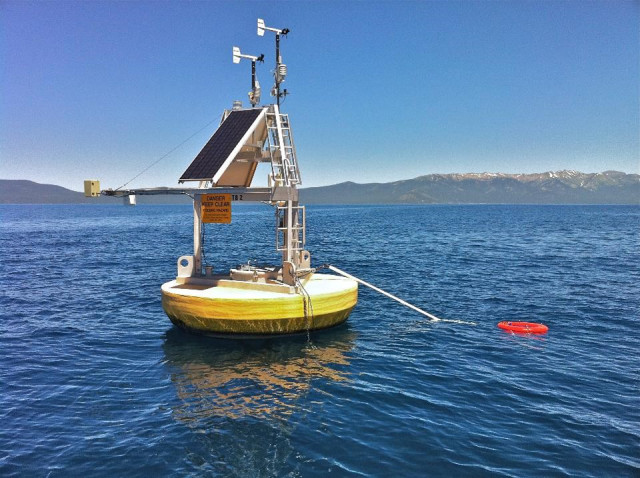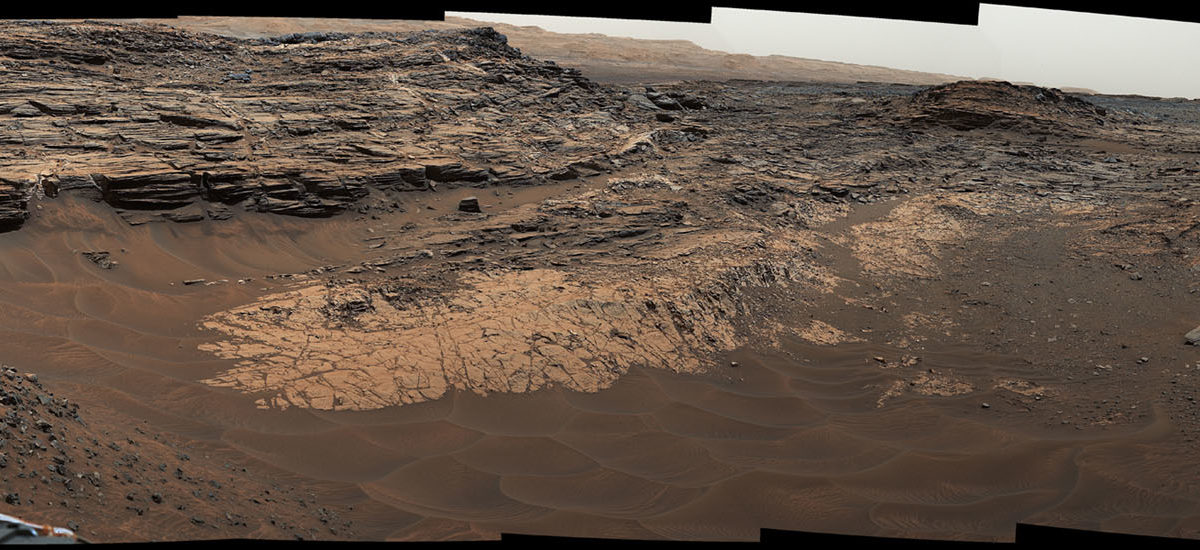
NASA’s Curiosity Mars rover shows the “Marias Pass” area where a lower and older geological unit of mudstone — the pale zone in the center of the image — lies in contact with an overlying geological unit of sandstone. (NASA/JPL-Caltech/MSSS)
NASA’s Curiosity Mars Rover Finds Plenty of Silica
As they reviewed data gathered by the Mars Rover, scientists found that some rocks in Gale Crater contained the chemical compound silica. In fact they say it’s a very high amount of the compound.
According to the researchers, silica is actually a combination of silicon and oxygen. On Earth we normally see the compound as quartz. But it can also be found in a number of other minerals.
Albert Yen, a Curiosity science team member at NASA’s Jet Propulsion Laboratory, says two geological processes that can increase the concentration of silica involves water. Knowing which of the two processes took place will allow scientists to learn more about the ancient wet environments of Mars.

The extinction of large animals from tropical forests could make climate change worse. New research published in Science Advances reveals that a decline in fruit-eating animals such as large primates, tapirs and toucans could have a knock-on effect for tree species. (Pedro Jordano)
Climate Change Could Worsen if Large Animals Become Extinct
An international team of researchers has found that climate change could worsen if large fruit eating animals, living in tropical forests, should become extinct.
After eating its fruit, the animals are known to scatter the seeds of large tree species in their waste material.
The researchers say birds and large mammals are responsible for almost all dispersal of the seeds for large plants such as trees.
These trees help counter climate change by capturing and storing a good amount carbon dioxide before it has a chance to escape into the atmosphere.
So if the large animals are taken from an ecosystem the researchers say it could lead to a loss in hardwood trees, which means more CO2, a primary greenhouse gas, winds up in the atmosphere.
According to the researchers, a number of large vertebrate species are currently being threatened by issues such as hunting, illegal trade and habitat loss.

Ambien (Zolpidem) tablets (Entheta/Wikimedia Commons)
Sleeping Aid Speeds Stroke Recovery Time in Mice
Stanford University School of Medicine scientists have found that mice, who had suffered strokes, recovered much faster if they were given low doses of a popular drug that helps treat insomnia.
A stroke occurs when the brain’s blood supply gets disrupted.
According to the researchers, initial brain damage caused by a stroke usually takes place within a couple of hours after the blood flow is interrupted and then continues to spread until the brain starts to rewire itself.
So far, there’s no known drug therapy that can help patients with their recovery once a stroke has occurred.
The researchers induced strokes in mice and then gave them low doses of Zolpidem, popularly known as Ambien.
They found the drug helped enhance a type of brain cell signaling activity, which dramatically improved the mice’s rate of recovery from stroke.
The researchers cautioned that their study results will first need to be independently duplicated by others before clinical trials can begin.

A combination of satellite data and ground measurements, such as from instrumented buoys like this one in Lake Tahoe on the California/Nevada border, were used to provide a comprehensive view of changing lake temperatures worldwide. The buoy measures the water temperature from above and below. (Limnotech)
Study: Climate Change Threatens Earth’s Freshwater Supply
A new study that examined more than half of Earth’s freshwater supply finds climate change is quickly warming the world’s lakes, which is seen as a threat to the supply of freshwater and its ecosystems.
Researchers analyzed more than 25 years of data that includes both satellite and ground measurements of some 235 lakes located throughout six continents. They found that our planet’s lakes are warming by .34 degrees Celsius every ten years.
While the noted temperature increase may seem small and insignificant, the scientists say it’s bigger than the warming rate of either the ocean or the atmosphere.
They say water temperature can affect the health and sustainability of our ecosystems.
They add that when there’s such a quick and wide shift away from normal lake temperatures the life forms it hosts could change radically and even disappear.
The study’s lead author Catherine O’Reilly from Illinois State University says that the results of the study suggest that large changes in our lakes are not only unavoidable, but are probably already happening.























Comments are closed.